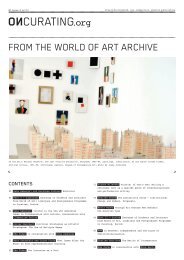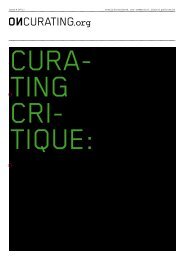You also want an ePaper? Increase the reach of your titles
YUMPU automatically turns print PDFs into web optimized ePapers that Google loves.
071 Issue # 11/11 : PublIc Issues<br />
vary, of course, but once you open yourself up to the<br />
other's experience, that otherness can undergo change.<br />
For instance in the neighbourhood, we were perhaps the<br />
others ourselves, a minority group with a way of life<br />
different from that of the majority of people living there<br />
at the time. Isn't it more healthy if those who have<br />
this other role keep changing? Empowerment is too large a<br />
claim; it actually suggests that we have the power. Why<br />
don't we take this <strong>as</strong> something done together, collaboratively?<br />
At that point we can talk about empowering space<br />
and everyday life rather than persons. Empowerment is<br />
not something that can be done only by one side in a re-<br />
lationship. Oda Projesi, which takes nourishment from urban<br />
space, and whose survival is b<strong>as</strong>ed on the city's dynamics,<br />
cannot have power by itself.<br />
Open-endedness<br />
Derya: What is the role of open-endedness in Oda Projesi's<br />
works? In her article in October, Claire Bishop (2004)<br />
discusses the question of open-endedness, and argues that<br />
it is a problematic artistic strategy. She thinks that art<br />
can convey political messages by performing disruptive<br />
gestures that make spectators question themselves rather<br />
than by being open-ended.<br />
Özge: Open-endedness is not something that those sharing<br />
an environment (including us) are aware of in practice.<br />
Rather, this is specified during the process; in other<br />
words, we cannot design a project <strong>as</strong> open-ended from the<br />
beginning. Only if the will of the participants h<strong>as</strong><br />
continuity or if a state of action-reaction is created may<br />
the project become open-ended. This is like not cutting<br />
the process with an abrupt end; and if there is a halt,<br />
it is a matter of resuming the process with new things<br />
to say... the fact that objects appearing <strong>as</strong> products<br />
actually function <strong>as</strong> vehicles defines open-endedness.<br />
References<br />
Agamben, Giorgio (2000). Means Without<br />
end: Notes on Politics. University of<br />
Minnesota Press, Mineapolis.<br />
Babi<strong>as</strong>, Marius. "On the Strategic Use<br />
of Politics in the Context of Art".<br />
In: IKSV (2005). Art, city and Politics<br />
in an expanding World, Writings from<br />
the 9th International Istanbul bien-<br />
nial, Istanbul.<br />
Barthes, Roland. "Authors and Writers<br />
1960". In: Susan Sontag (ed.) (1982).<br />
A barthes Reader. Hill & Wang, New<br />
York.<br />
Bishop, Claire. (2006). "The Social<br />
Turn: Collaboration and its discontents".<br />
In: Artforum Vol. 44, 2/2006,<br />
pp. 178–183.<br />
Bishop, Claire. "Antagonism and<br />
Relational Aesthetics". In: October,<br />
Vol. 110, 3/2004, pp. 51–79.<br />
Bourriaud, Nicol<strong>as</strong> (2002). Relational<br />
Aesthetics. Trans. S. Ple<strong>as</strong>ance &<br />
F. Woods. Les Presses du Réel, Dijon.<br />
Deleuze, Gilles. "Intellectuals &<br />
Power (A conversation between Michel<br />
Foucault and Gilles Deleuze)."<br />
In: Donald F. Bouchard (ed.) (1977).<br />
language, counter-Memory, Practice:<br />
selected essays and Interviews by<br />
Michel Foucault. Cornell University<br />
Press, New York.<br />
Erdog˘an, Necmi (ed.) (2002). Yoksulluk<br />
Halleri: Türkiye'de Kent Yoksullug˘unun<br />
Toplumsal Görünümleri [States of<br />
Poverty: Social Representations of<br />
Urban Poverty in Turkey] Demokr<strong>as</strong>i<br />
Kitaplıg˘ı.<br />
Holloway, John (2002). change the<br />
World without Taking Power. The<br />
Meaning of Revolution Today. Pluto<br />
Press, London.<br />
Kravagna, Christian (1998):<br />
http://www.republicart.net/disc/aap/<br />
kravagna01_en.htm.<br />
Lind, Maria. "Actualisation of Space:<br />
The C<strong>as</strong>e of Oda Projesi". In: Claire<br />
Doherty (ed.) (2004). From studio<br />
to situation. Black Dog Publishing,<br />
London, pp. 109–121. See also www.<br />
republicart.net/disc/app/lind01_en.<br />
htm.<br />
Negri, Antonio (2002). "The Multitude<br />
and the Metropolis". In: Posse<br />
[See Trans. Arianna Bove, http://www.<br />
generation-online.org/t/metropolis.<br />
htm].<br />
Spivak, Gayatri Chakravorty.<br />
"Can the Subaltern Speak?". In: Patrick<br />
Williams and Laura Chrisman (eds.)<br />
(1994), colonial Discourse and Post-<br />
colonial Theory: A Reader. New Colum-<br />
bia University Press, New York.<br />
Ouroussoff, Nicolai. New York Times,<br />
(12 March 2006): http://www.nytimes.<br />
com/2006/03/12/arts/design/12ouro.<br />
html?_r=1.


![Download as PDF [10.6 MB]](https://img.yumpu.com/4266533/71/500x640/download-as-pdf-106-mb.jpg)

